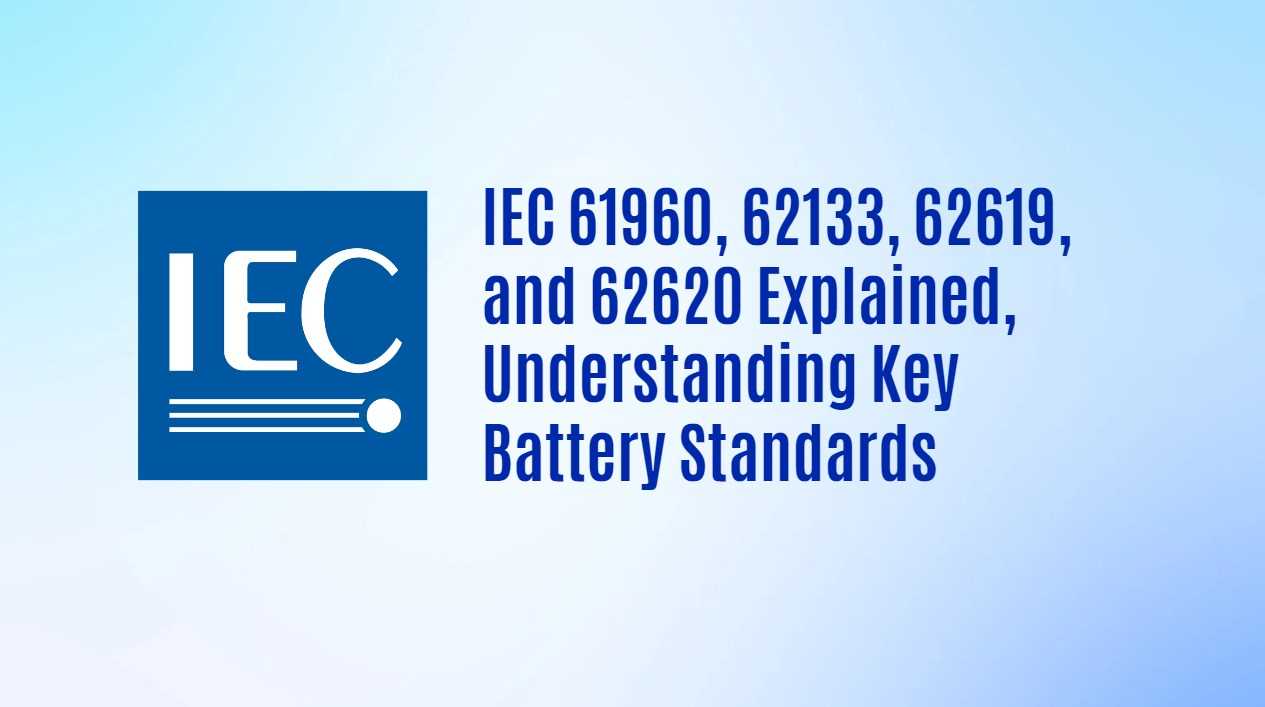In the fast-paced realm of battery technology, adherence to established standards is vital for ensuring safety, performance, and compatibility across various applications. The International Electrotechnical Commission (IEC) has developed several essential standards—IEC 61960, IEC 62133, IEC 62619, and IEC 62620—that govern the design, testing, and utilization of lithium batteries. This guide provides a detailed overview of these standards, highlighting their significance in the industry.
IEC 61960: Performance Specifications for Lithium Batteries
Overview
IEC 61960 outlines the performance tests, designations, markings, dimensions, and other requirements for secondary lithium cells and batteries intended for portable applications. This standard is crucial for manufacturers and users alike to evaluate the performance characteristics of lithium batteries effectively.Key Features
- Performance Testing: Establishes criteria for assessing battery performance under various conditions to ensure reliability.
- Designations and Markings: Provides guidelines for labeling batteries, ensuring clear identification of specifications for users and manufacturers.
- Application Scope: Primarily focuses on portable applications such as consumer electronics and power tools.
Updates
The latest edition, IEC 61960-4:2020, expands upon previous versions by including specifications for coin-type lithium cells and batteries used in applications like memory backup systems.
IEC 62133: Safety Requirements for Portable Batteries
Overview
IEC 62133 addresses the safety requirements for portable sealed secondary cells and batteries containing alkaline or other non-acid electrolytes. This standard is essential for ensuring that lithium-ion batteries are safe for consumer use.Key Features
- Safety Testing: Outlines rigorous safety tests designed to prevent hazards such as overheating, leakage, and explosions.
- Compatibility Assurance: Ensures that batteries can be safely utilized in various devices without posing risks to users or equipment.
- Design Guidelines: Offers recommendations for battery design that enhance safety features.
Applications
This standard is widely applicable across multiple industries, including consumer electronics, electric vehicles, and renewable energy systems.
IEC 62619: Industrial Application Safety Standards
Overview
IEC 62619 focuses on the safety requirements for secondary lithium-ion cells and batteries used in industrial applications. This standard is particularly relevant for larger battery systems found in electric vehicles and energy storage solutions.Key Features
- Safety Protocols: Establishes comprehensive protocols to mitigate risks associated with high-capacity lithium-ion batteries.
- Detailed Testing Procedures: Includes thorough testing methodologies to evaluate thermal stability and electrical performance.
- Regulatory Compliance Support: Aids manufacturers in meeting international regulatory requirements specific to industrial battery systems.
Importance
With the growing demand for large-scale energy storage solutions, adherence to IEC 62619 ensures that these systems operate safely and efficiently.
IEC 62620: Performance Standards for Stationary Applications
Overview
IEC 62620 specifies performance requirements for secondary lithium-ion cells used in stationary applications. This standard is vital for guaranteeing the reliability of batteries deployed in energy storage systems.Key Features
- Performance Criteria Definition: Establishes criteria to ensure stationary batteries can withstand environmental stresses effectively.
- Durability Testing Protocols: Includes tests that assess longevity and reliability under various operating conditions.
- Standardization Promotion: Encourages uniformity in battery design and performance across different manufacturers.
Applications
This standard is critical for stationary energy storage solutions utilized in renewable energy systems, grid stabilization efforts, and backup power applications.
Conclusion
The IEC standards—IEC 61960, IEC 62133, IEC 62619, and IEC 62620—are instrumental in shaping the landscape of battery technology. By establishing rigorous performance and safety criteria, these standards not only protect consumers but also foster innovation within the industry. As battery technology continues to evolve, compliance with these standards will remain essential in ensuring safe and efficient energy solutions across various applications.




